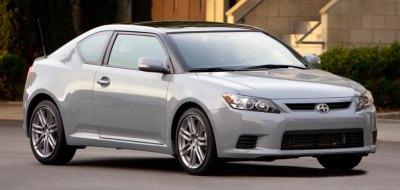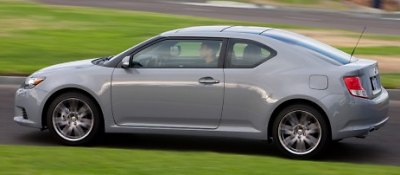Scion tC
Debut: 2010 |
||||
Spacious, practical and cheap. These have been the selling points of the outgoing (Toyota) Scion tC. The second generation is the same. This car is still designed primarily for the United States market, where more than 300,000 people bought it since 2004. Over there, its entry price is just US$19,000. Unusually, its production takes place in Japan, so you can see how slim its profit margin is. Stranger still, the American-targeted Japanese-built car is derived from the platform of a European car, Toyota Avensis, sharing the latter's 2700mm wheelbase (incidentally identical to the old car), MacPherson struts front and double-wishbones rear suspensions, though it is fitted with a larger, 2.5-liter four-cylinder engine destined to the American market. 6-speed manual and automatic transmissions are offered for selection. Compare with the old engine, the new one gets an extra 132 c.c., variable valve timing at the exhaust side, friction-reducing roller rocker valve lifters and variable-length intake manifolds. This result in 180hp (up 20hp) and 173 lb-ft of torque (+10 lb-ft). A pair of counter-rotating balancer shafts keeps it running smooth until 6300 rpm. Performance is okay rather than remarkable, with 0-60 mph done in 7.6 seconds for manual gearbox or 8.3 seconds if you tick the automatic option. If you want more performance, pay an extra US$2,000-3,000 to get a Golf GTI, Civic Coupe Si, Genesis Coupe 2.0T or Mustang V6.
I would do that, because the tC is about as stylish as a refrigerator. Maybe Generation Y would love it. I'm not. The interior gives mixed impression. On the positive side, its long wheelbase and relatively tall profile result in an unusually roomy cabin for a coupe (well, if you really see it as a "coupe"). Passengers under 5 ft 10 will have no problem with the rear seats. Moreover, all seats are big and comfy, and the audio is quite powerful (again to please Gen-Y). On the negative side, the cabin is just as ugly as the exterior, and cheap hard plastics are used everywhere to make possible its low price. We can understand that, but we cannot forgive that. An Audi-like leather-wrapped flat-bottom steering wheel might raise your expectation on its handling. On the road, yes, it is noticeably sportier than the last generation, thanks to a stronger chassis, wider tracks, firmer suspensions, grippier tires, larger brakes and a decent electrical power steering. Nevertheless, such progress is just the same as everybody else these days. Compare with Civic Si or Golf GTI, the car feels less precise and far less communicative. Its nose-heaviness is revealed by early understeer. Its engine is dull to rev and to listen. Quality of gearshift is average. None of its dynamic aspects is impressive. Moreover, with 18-inch low-profile tires its ride is choppy on bad surfaces. Don't see it as a sporty coupe. Scion tC is essentially a beefed up 2-door sedan. Seems hard to raise the interest of car lovers. |
||||
| The above report was last updated on 14 Aug 2010. All Rights Reserved. |
| Specifications | |||||||||||||||||||||||||||||||||||||||||||||||||||||||||||||||||||
|
|||||||||||||||||||||||||||||||||||||||||||||||||||||||||||||||||||
| Performance
tested by: *C&D |
Copyright©
1997-2010
by Mark Wan @ AutoZine

